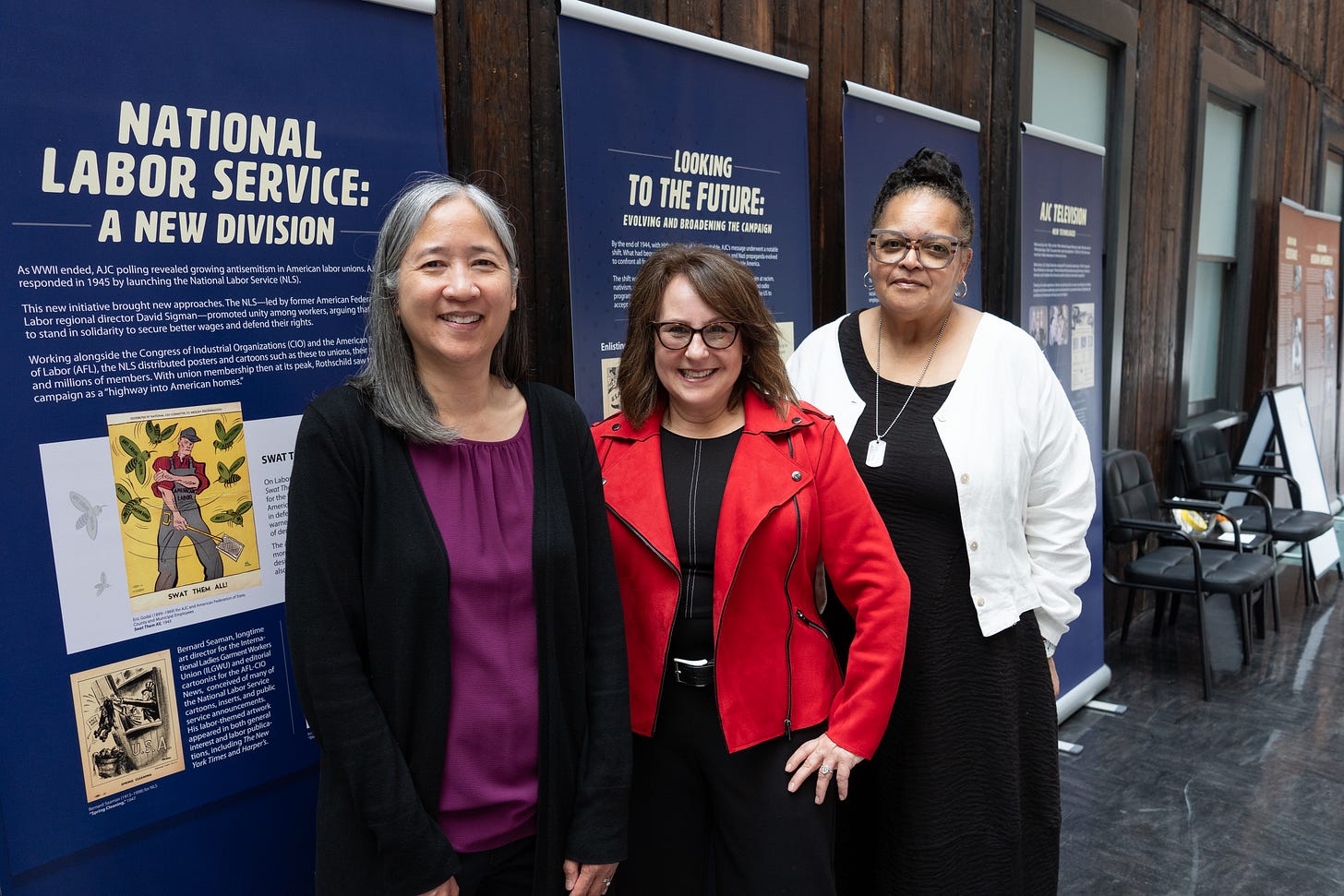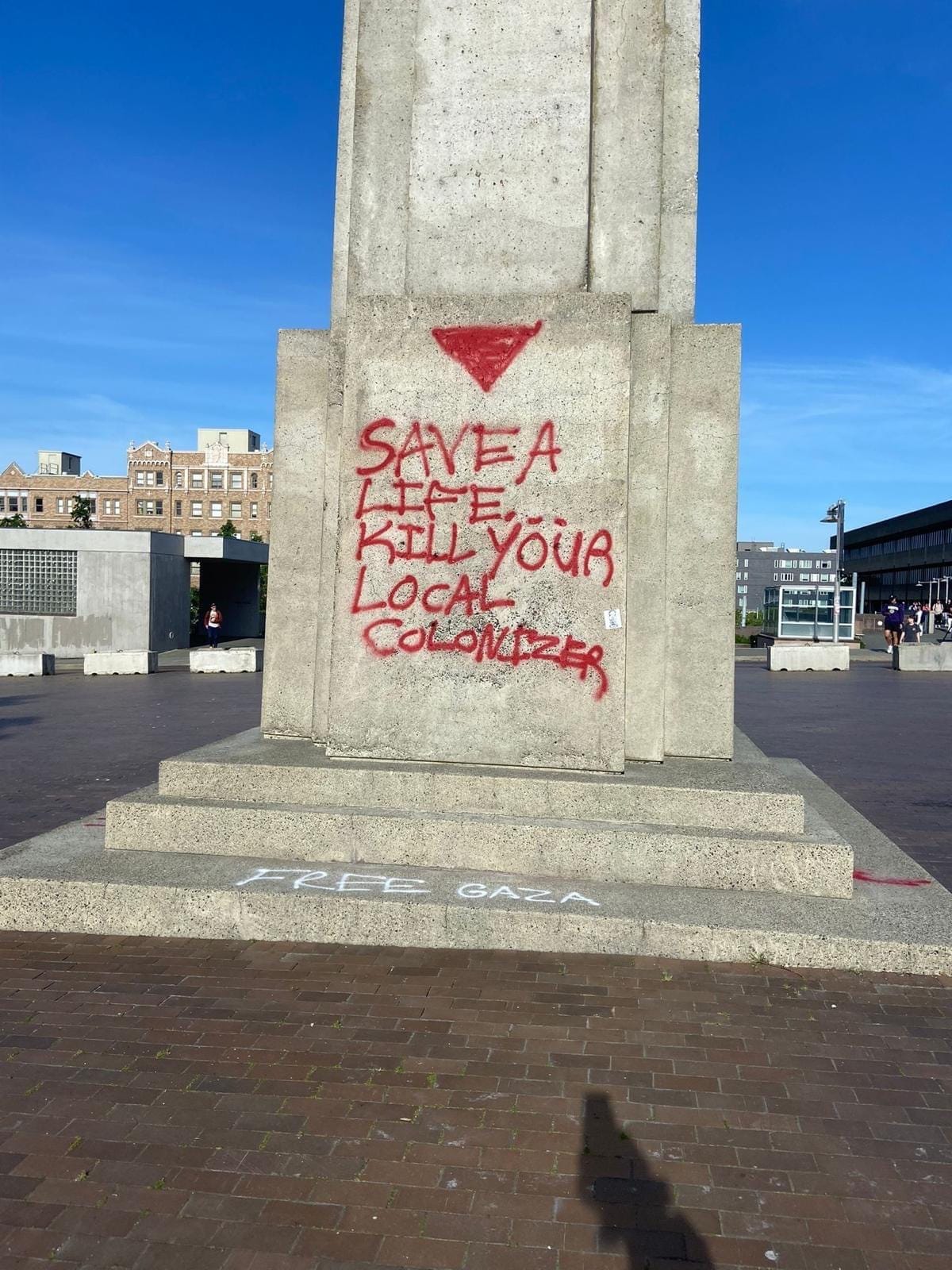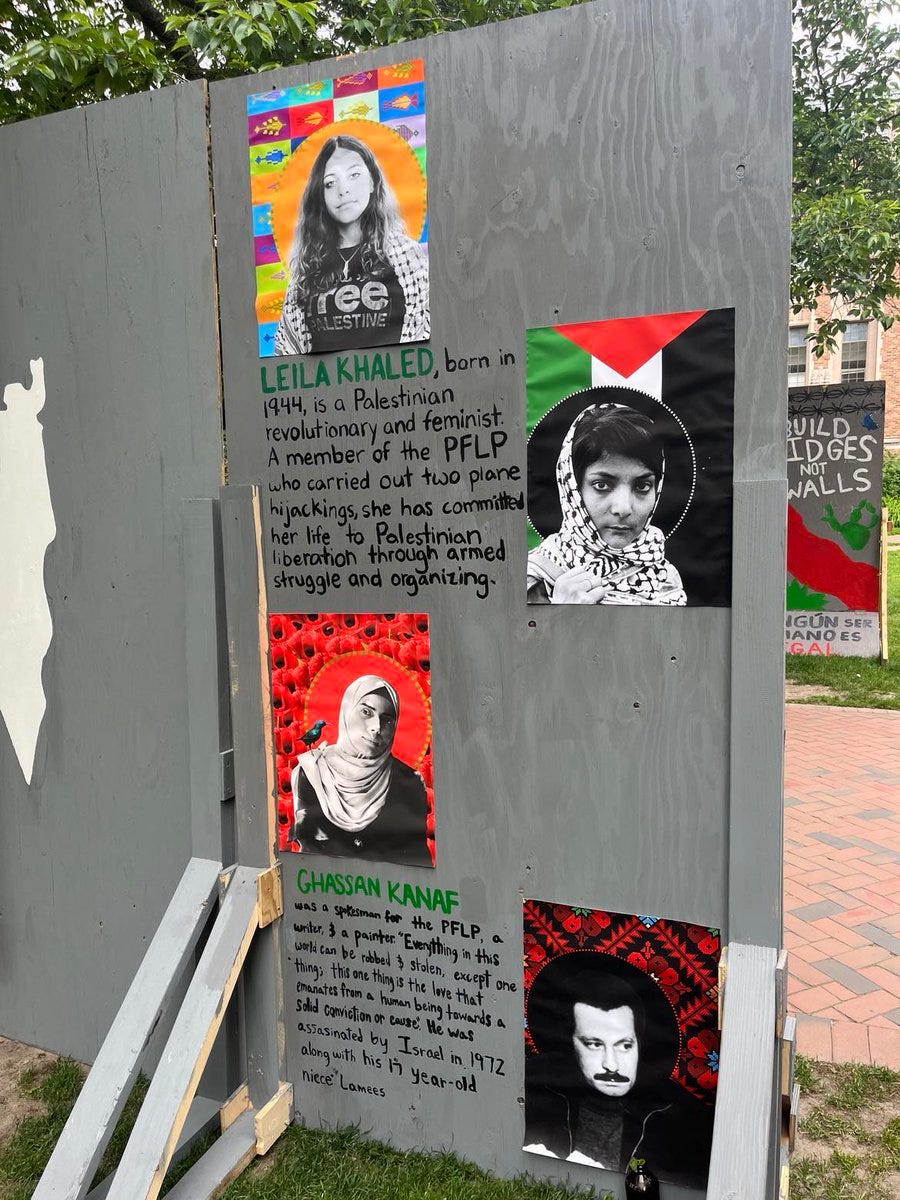What Are We Supposed to Do?
To some, Jewish organizations look useless at their most critical moment.
A few weeks ago, a Cholent reader sent me a scathing piece from the Substack newsletter Future of Jewish that rips into the world of legacy Jewish organizations for failing to take a stand against anti-Israel activists and the fast and furious spread of anti-Semitism.
The reader wrote, “How can any Rabbi or leader eat their bowl of corn flakes in the morning and act business as usual when Jewish kids are getting pummeled in a government hosted pogrom just a few miles away? How?!”
Since October 7th, the question of how legacy Jewish organizations and synagogues, which are often endowed and fully staffed, are supposed to react has been on many minds, including my own.
As Joshua Hoffman, the author of Future of Jewish, rails:
…as we watch the “anti-Israel” violent demonstrations sweeping across Europe, Australia, Canada, and the United States, I cannot help but wonder: Where are all the Jewish organizations and their collective billions of dollars? And where are all the “leaders” of these organizations who incessantly boast about their fabulous work?…
As one longtime Jewish professional told me, the irony of the “organized Jewish world” is that it is almost entirely unorganized.
And by “unorganized” she meant inefficient, bureaucratic, territorial, egotistical, and mostly just ineffective — while much of the “gatekeepers” act as though none of this is the case, or that it is the case at every other organization, except for theirs.
For decades, Jewish organizations have been extolling the virtues of community, claiming to fight anti-Semitism, and raising loads of money. One might have expected that after October 7th, they would have come forward with some grand strategy. As Hoffman argues, they went into October 8th with the October 6th playbook. The result was a lot of emails that seemed to say, “we’re working on it.”
In early winter, readers asked me where they could find a list of rallies or ways to support Israel in person or financially. Getting a list of resources wasn’t intuitive or easy. Other than some talks and vigils, excellent as they were, there seemed to be no unified response that could hold a candle to the tenor of banging drums and rhyming chants of the anti-Israel rallies. How is it possible the Jewish community could be so notoriously organized and seem to have no plan? How ridiculous was it that Jews could be hiding in the proverbial attic (or literally in a library) while throngs of barely legal adults made uncompromising demands that university administrators agreed to listen to? How is it possible that there’s a conspiracy that Jews run the world?
Last Sunday, a pro-Israel counter-protest took place at the University of Washington encampment. It wasn’t organized by the Jewish community. It was organized by Pursuit Church. “There are organizations that people expected to step up that didn’t,” says Ari Hoffman, president of BCMH and host of the Ari Hoffman Show on 570 KVI Seattle, who spoke at the event. “There are Jewish organizations that have worked behind the scenes. AJC, StandWithUs, those two organizations have really been rock stars. There are a lot of other organizations that have been MIA in all of this.”
But what are they supposed to do? Is it fair to say mainstream organizations were working off an outdated or misguided playbook? Why do they seem not seem to be meeting the moment? I thought about this and asked around. Here are some preliminary conclusions.
Reason 1: The big tent. American Jews are diverse, and organizations have bent over backwards to accommodate difference. Relying on the principles of dialogue and debate — l’shem shemayim, argument for the sake of heaven albeit for no real practical purpose — they have worked to create programs upon programs to keep Judaism alive and functioning on American soil, where it can so easily go to pot. This is a noble cause, but it makes organizations skittish. Signing on to the “wrong” approach could sink your membership. It’s just too risky. Better to have a vigil/conversation/song circle where nothing can go sideways.
Reason 2: The American bet. Influenced by the platforms of the Reform movement and the unprecedented religious tolerance of the American project, Judaism came to align itself with the principles of universalism, charity, and social justice. The Pittsburgh Platform of 1885 eschewed religious practice while declaring Judaism a religion, not a nation. As Jews assimilated into American society in the second half of the 20th century, they made a bet: Hang on to Judaism by staking it to liberal American values, and Judaism will stick around as a cultural force for good. The core narrative of Yetziat Mitzrayim, the exodus from Egypt, which appears in almost every prayer, became overshadowed by another Torah theme, “strangers in a strange land, do not oppress the stranger.” The idea of liberation and nationhood were shelved in favor of a values-based identity.
Was this a bad bet? In many ways it was smart, a subconscious survival mechanism, but it was also a risk. “In some ways there have been signs that the ground below us has been shifting,” says ADL Pacific Northwest director Miri Cypers. “I do think that in some respects we kind of anticipated before October 7th that the climate was shifting and it wasn’t going in the direction we wanted. ADL was able to ask hard questions: ‘Do the interventions we use still work? Do we need to add tools to our toolkit?’”
Reason 3: Nothing to see here, folks. A leader at a mainstream organization explained (when I assaulted him with questions at a public gathering) that Jewish organizations need to focus on being not reactive. There’s a whole subset of reasons for this approach, I think.
Reason 3.1: Focus on the long game. What have mainstream organizations been doing all these years? The cynics will say they exist to keep on existing, using flare-ups of anti-Semitism to prove they still serve a purpose. The less cynical answer is that they’ve been strategically working on the VIP level to ensure long-term support based on shared values. The general public may not see this, but it’s happening. According to Solly Kane, president of the Jewish Federation of Greater Seattle:
It’s an unprecedented time and our Jewish organizations are working tirelessly to combat the rampant rise in antisemitism, and support Israel and Israelis here in Seattle. The Federation and JCRC, in partnership with many other communal organizations, have been in regular communication with numerous school districts calling on them to protect our Jewish students. We have spoken out against misguided ceasefire resolutions in local municipalities. And, we have worked to reach out to leaders in the civic, business, and education communities to ask them to call out antisemitism whenever it occurs.
Cypers’s response is similar:
I think it is really important for Jewish organizations to act with discretion…We are working closely with communities on the ground as they are on the front lines with the students as far as determining a strategy.
Reason 3.2: Don’t make a scene. Many organizations have spent years building alliances. In an age of socially acceptable temper tantrums, it sucks to be the adult in the room. It’s also scary. “Notice that you didn’t see a lot of college kids at the rally,” says Ari Hoffman. “It’s not that we don’t have support. They don’t want their faces on anything or attribution on anything.”
There once was a different approach to communal activism. In the 1970s, Jewish Defense League activists held sit-ins and building takeovers and even blew things up to protest the mainstream American Jewish world’s approach to Soviet Jewry and Israel. According to their mission (from the ADL):
The Galut [diaspora] image of the Jew as a weakling, as one who is easily stepped upon and who does not fight back is an image that must be changed. Not only does that image cause immediate harm to Jews but it is a self-perpetuating thing. Because a Jew runs away or because a Jew allows himself to be stepped upon, he guarantees that another Jew in the future will be attacked because of the image that he has perpetuated. JDL wants to create a physically strong, fearless and courageous Jew who fights back.
This approach to activism was crushed for a number of reasons, not least because the group was designated a terrorist organization by the United States. The go-in-through-the-front-door model of organizing won out, and we’ve come to expect it from others, too.
Reason 3.3: The system still works. Doesn’t it? Doesn’t it? Surely if we keep doing the same things we’ve been doing — building alliances, talking to legislators, calling meetings, kindly asking people to do their damn jobs, it will all sort itself out. Kane directed me to a petition recently put out by Hillel International to “stand up for students.” While free speech is important, it starts, it’s really not cool when students call for intifada, and could university administrators please start enforcing their rules? Around the time this petition went out, someone scrawled “kill your local colonizer” in red spray paint on the UW campus and apparently no one was available to clean it up, so a community member showed up in the middle of the night with his own scrub brush.
Reason 3.4: Performative avoidance. One thing to watch for are bold and profound statements that don’t say anything. Boiled down, these “brave” statements saying something like: “We, at [organization name] hold space for everyone. We don’t take sides. We desire a lasting peace that is impractical, but we’ll figure that part out later. We didn’t take a stand before, but now that our building has been vandalized with hate speech, we reaffirm our support for Israel. What can we do now? We can hold space for everyone and not take sides. We’re all in this together!”
Reason 4: Communication breakdown. The dissipation of Jewish journalism across the country has led to a loss of centralized communication and real-time reporting on local issues. The vacuum it left is filled with partisan media and social media echo chambers. Jewish newspapers cannot stop the trend or change the algorithm, but they can serve as an information and events hub, not to mention a place for lively debate. But this is also a PR battle. Organizations and individuals are in fact doing a hell of a lot right now, but no one is talking about it — especially the mainstream news outlets.
Reason 5: Not our circus, not our monkeys. Or, same pitchforks, different villagers. “They’re not going to free Palestine with their protests,” Ari Hoffman says. “Are we going to free Israel with ours?” Not only is waging a public fight futile, it’s also not necessarily our job. “Frankly, our broader Seattle community needs to do better in rapidly combating antisemitism and protecting the Jewish community,” Kane says. “We know where the plague of antisemitism can lead and the Federation is going to continue to stand up and fight against it, and call on other leaders to speak out against it.”
I love hearing from you, and I’m curious what you think. How is the organizational world supposed to respond to this moment?
In other news
UW president Ana Marie Cauce calls for a ceasefire?
On Wednesday, The Seattle Times announced in a breathless breaking headline that University of Washington President Ana Marie Cauce had called for a ceasefire, suggesting she was acquiescing to protesters’ demands. The article is referring to a letter Cauce shared with the UW community Wednesday. The letter states:
We join the calls by national and international leaders for a ceasefire that will include an end to military operations, the release of the hostages taken by Hamas on Oct. 7, and a surge of humanitarian aid for Palestinians and all people in Gaza — with the goal of achieving a lasting peace.
This could be interpreted as boilerplate and a set up to what she really wanted to say, which is that the encampment is a mess but the university can’t do much about it. The letter criticizes the protesters’ “untenable” encampment, calls some of the rhetoric “vile and antisemitic,” and shuts down their creeping demands, like the establishment of a department to set up an “‘anti-Zionist’ litmus test for faculty hiring.” Cauce concludes that the protestors’ actions and demands will not change the position of the school.
As I reported the other week, evidence exists for the support of the PFLP, a designated terrorist group, on the UW campus. The PFLP appears to be the inspiration behind the new United Liberation Front, the group that is likely behind artwork honoring PFLP “heroes,” including Leila Khaled, whose claim to fame is being the first female airline hijacker.
Inconvenient truth
In a shockingly insightful piece from the New York Times republished in the Seattle Times, details about Hamas’s authoritarian rule emerge.
Not too late
Northwest Yeshiva High School reopened its admission window for students reconsidering their schools given the rise in anti-Zionism and anti-Semitism. In an email, NYHS Director of Admissions Beth Jacoby wrote, “Northwest Yeshiva High School would like to re-affirm our place in the Seattle community as a warm and welcoming co-ed Jewish High School, and let you know that we have space available, including for transfer students, for the 2024-2025 school year.” Enrollment is open through the end of May.
Confronting discrimination

The Washington State Jewish Historical Society, in partnership with the Black Heritage Society and the Wing Luke Museum, are debuting a new joint exhibit called “Confronting Hate Together.” The exhibit will be up at Wing Luke from May 24th to June 30th. It took a year and a half of collaboration and connects each communities’ struggles with discrimination and violence. (May is both Jewish American Heritage Month and Asian American and Pacific Islander Heritage Month.)
“For us, it is not enough to shine a light on hate, but to promote conversations about hate, antisemitism, bigotry, and racism in supportive settings, while offering visitors the tools to act on their learning,” WSJHS director Lisa Kranseler told Seattle Medium.
The exhibit will consist of panels and a four-part oral history podcast, which will be available on YouTube.
Community Announcements
Check out the Seattle Jewish community calendar.
Check out ways to support Israel through UNX (UnXeptable) Seattle.
Candlelighting in Seattle is at 8:25 p.m. The parasha is Emor.
Shoutouts
Thank you to the Federation's JCRC team for being so responsive to the ongoing issues at Nathan Hale High School. Max and Perri do amazing work, including working to find balance in challenging situations. —Paul and Danielle Nacamuli
Kol hakvod to MIT for not capitulating to the antisemites and terror apologists of today, instead focusing on what is important at universities: the pursuit of knowledge and furthering human progress. —Akiva Erezim
Mazal buenu to our Seattle Sephardic community for hosting inspiring events in honor Yom Hazikaron and Yom Ha’atzmaut at Sephardic Bikur Holim and Ezra Bessaroth. —Ty Alhadeff






Emily, there are no really good answers to what the legacy Jewish organizations should do.
I will say that any organization that is trying to be all things to all people, winds up being nothing to anyone.
For me Jewish organizations that feel the need to universalize our historical Jewish experience and decide that Tikun Olam becomes our religion gives the next generation an opportunity to reassess the Jewish enterprise and fall prey to the fringe groups.
If Oct 7th has taught us anything in the Puget Sound it is that traditional allyship was an illusion and we have to reimagine who supports Israel and our mainstream Jewish community. The last time our community was united in support of our tribe (not a dirty word) was Soviet Jewry and Ethiopian Jewish rescue.
I will give one suggestion.
Perhaps the Federation can arrange a summer program to arm Jewish College Bound students with a clear understanding of their heritage and Israel’s history so they can combat 25 + years of progressive anti Israel indoctrination in Academe.
And by the way, the door is open if any Jewish organization is serious about supporting me as a qualified, ethical, respectable, sincere person in my ability to serve on this King County commission without having to listen to antisemitic content and without being verbally bullied off the group for gentle attempts to complain about. (I have since served on another commission that didn't contain antisemitism, but I lost professional opportunity and helpful compensation because of what happened and no Jewish organization being there for me.)